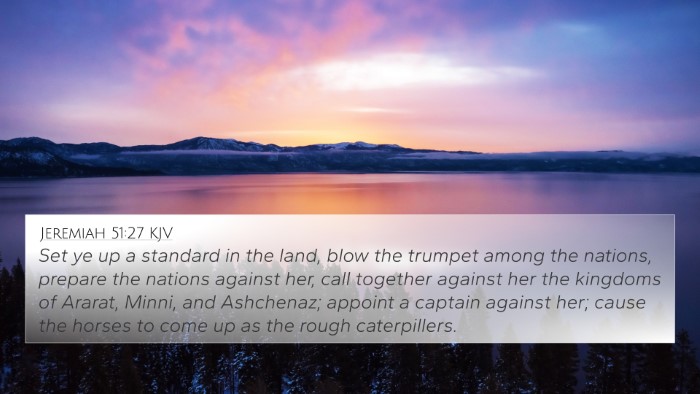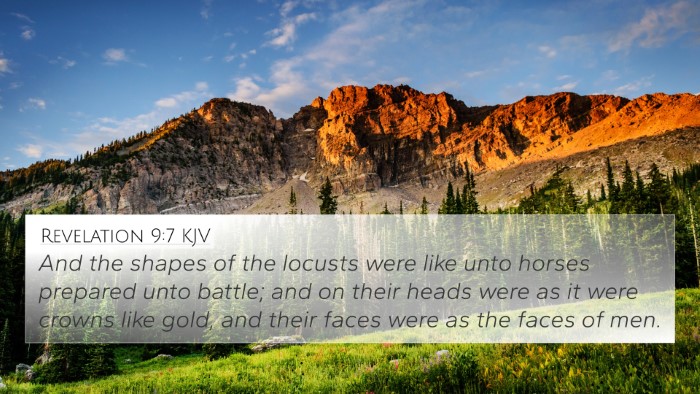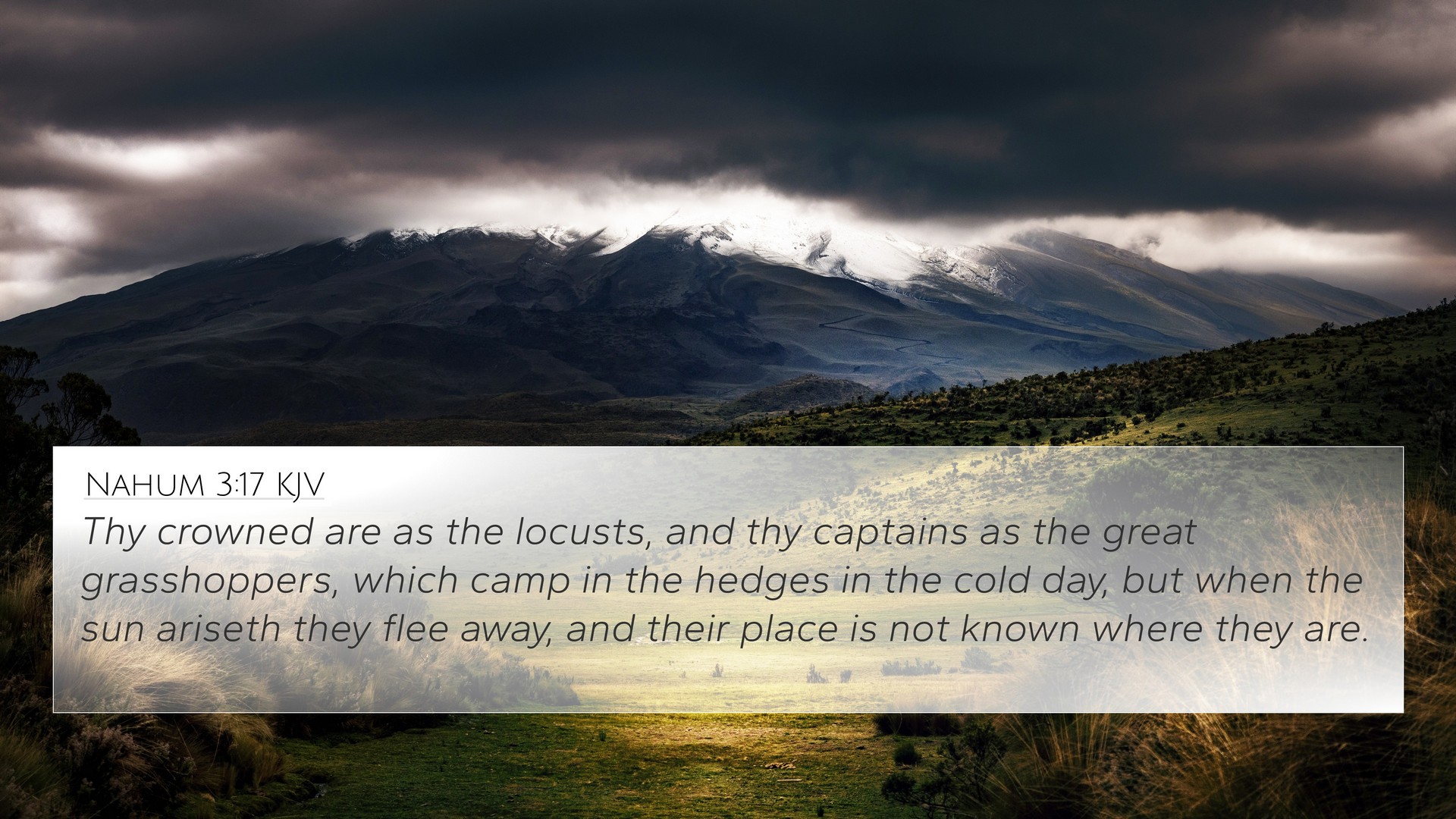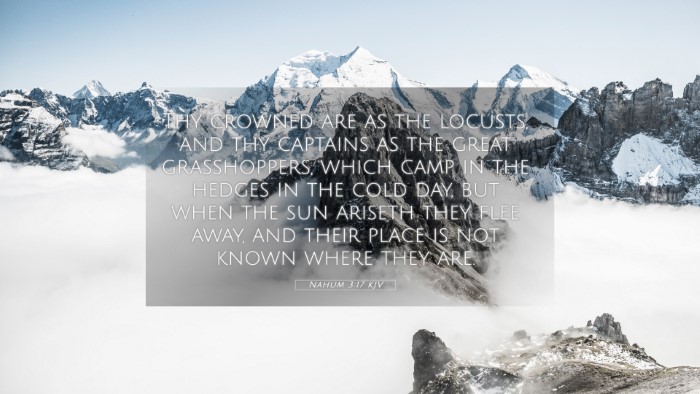Old Testament
Genesis Exodus Leviticus Numbers Deuteronomy Joshua Judges Ruth 1 Samuel 2 Samuel 1 Kings 2 Kings 1 Chronicles 2 Chronicles Ezra Nehemiah Esther Job Psalms Proverbs Ecclesiastes Song of Solomon Isaiah Jeremiah Lamentations Ezekiel Daniel Hosea Joel Amos Obadiah Jonah Micah Nahum Habakkuk Zephaniah Haggai Zechariah MalachiNahum 3:17 Similar Verses
Nahum 3:17 Cross References
Thy crowned are as the locusts, and thy captains as the great grasshoppers, which camp in the hedges in the cold day, but when the sun ariseth they flee away, and their place is not known where they are.
Uncover the Rich Themes and Topics of This Bible Verse
Listed below are the Bible themes associated with Nahum 3:17. We invite you to explore each theme to gain deeper insights into the Scriptures.
Nahum 3:17 Cross Reference Verses
This section features a detailed cross-reference designed to enrich your understanding of the Scriptures. Below, you will find carefully selected verses that echo the themes and teachings related to Nahum 3:17 KJV. Click on any image to explore detailed analyses of related Bible verses and uncover deeper theological insights.

Jeremiah 51:27 (KJV) »
Set ye up a standard in the land, blow the trumpet among the nations, prepare the nations against her, call together against her the kingdoms of Ararat, Minni, and Ashchenaz; appoint a captain against her; cause the horses to come up as the rough caterpillers.

Revelation 9:7 (KJV) »
And the shapes of the locusts were like unto horses prepared unto battle; and on their heads were as it were crowns like gold, and their faces were as the faces of men.
Nahum 3:17 Verse Analysis and Similar Verses
Nahum 3:17 Summary and Interpretation
Nahum 3:17 states: "Thy crowned are as the locusts, and thy captains as the great grasshoppers, which camp in the hedges in the cold day, but when the sun ariseth they flee away; and their place is not known where they are." This verse serves as a powerful metaphor detailing the fleeting and insignificant nature of the leaders of Nineveh in comparison to their power.
Understanding the Verse
This verse holds a critical perspective on the leaders of Nineveh, suggesting that their glory and might are transient and weaken in the face of divine judgment. Several commentaries provide insight into the underlying meanings:
Matthew Henry's Commentary
Matthew Henry emphasizes the metaphorical significance of locusts and grasshoppers: they represent the officials of Nineveh whose might and strength are also temporary. They appear strong like the locusts, but ultimately, they are powerless against God's will. Henry notes that just as locusts are driven away by the sun, these leaders will be scattered when God's judgment falls upon Nineveh. This portrays a theme of divine sovereignty, illustrating how human power fades away in face of God's decrees.
Albert Barnes' Notes
Albert Barnes points out the imagery used in the text, showcasing how the captains of Nineveh seem numerous and formidable like swarms of locusts but are ultimately inconsequential. Barnes reflects on the idea of leaders being unable to stand firm under the pressure applied by God's authority, highlighting the theme of the ephemerality of human leadership and the eventual downfall of those who oppose divine mandates.
Adam Clarke's Commentary
Adam Clarke provides a deeper analysis of the cultural context, explaining that the comparison strengthens the warning against complacency in leadership. He asserts that just like grasshoppers that are scattered at the first sign of danger, the leaders of Nineveh will not remain steadfast. Clarke also emphasizes the certainty of their downfall, which resonates with the overarching message of the prophecy concerning Nineveh's destruction.
Bible Verse Cross-References
To fully understand Nahum 3:17, we consider several related scriptures that highlight the themes of transience of power and divine judgment:
- Isaiah 40:6-8 - "All flesh is grass..." This verse echoes the message that human life and power are temporary.
- Psalms 37:10-11 - "For yet a little while, and the wicked shall not be..." This emphasizes the eventual fate of the wicked akin to the leaders of Nineveh.
- Proverbs 16:18 - "Pride goes before destruction..." This relates to the prideful leaders that will meet their downfall.
- Lamentations 4:16 - "The anger of the LORD hath divided them..." This speaks to divine judgment differentiating the righteous from the wicked.
- Ezekiel 18:30 - "Cast away from you all your transgressions..." Here, the call for repentance resonates with the notion of turning from fleeting power.
- Jeremiah 51:57 - "And I will make drunk her princes, and her wise men..." This illustrates the futility and downfall of the leaders likened to those in Nahum 3:17.
- Romans 2:6 - "Who will render to every man according to his deeds..." This highlights the theme of accountability before God.
- 1 Corinthians 3:13 - "Every man's work shall be made manifest..." This emphasizes God's ultimate judgment on the works of men, contrasting fleeting human authority.
- James 4:14 - "Whereas you do not know what will happen tomorrow..." This verse serves as a reminder of life's uncertainty and the temporary nature of human endeavors.
- Revelation 20:11 - "And I saw a great white throne..." This speaks to the final judgment that all leaders and authorities will face.
Conclusion
In conclusion, Nahum 3:17 vividly portrays the fragility of human authority in the light of divine judgment. Through the metaphor of locusts and grasshoppers, the verse succinctly reminds believers of the temporality of worldly powers and the prevailing might of God's sovereignty. The insights gleaned from the public domain commentaries, when cross-referenced with other biblical texts, provide a comprehensive understanding of this verse and its lasting implications.
Thematic Bible Verse Connections
Understanding Nahum 3:17 invites readers to engage in deeper thematic Bible verse connections, expanding on the idea of finite human efforts in the face of eternal divine authority.
Tools for Bible Cross-Referencing
For those looking to explore these connections further, utilizing Bible concordances, Bible cross-reference guides, and studying extensive Bible reference resources can enhance the understanding of how these verses relate and complement each other.


